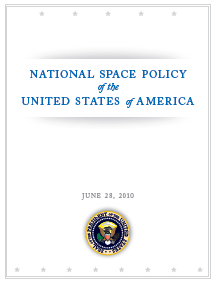The National Space Policy of the United States is issued by the White House and states the principles and goals by which the United States will pursue space. The current policy emphasizes security issues, encourages private enterprise in space, and characterizes the role of U.S. space diplomacy largely in terms of persuading other nations to support U.S. policy.
The following are the goals for national space programs: [1]
- Energize competitive domestic industries to participate in global markets and advance the development of: satellite manufacturing; satellite-based services; space launch; terrestrial applications; and increased entrepreneurship.
- Expand international cooperation on mutually beneficial space activities to broaden and extend the benefits of space; further the peaceful use of space; and enhance collection and partnership in sharing of space-derived information.
- Strengthen stability in space through domestic and international measures to promote safe and responsible operations in space; improved information collection and sharing for space object collision avoidance; protection of critical space systems and supporting infrastructures, with special attention to the critical interdependence of space and information systems; and strengthening measures to mitigate orbital debris.
- Increase assurance and resilience of mission-essential functions enabled by commercial, civil, scientific, and national security spacecraft and supporting infrastructure against disruption, degradation, and destruction, whether from environmental, mechanical, electronic, or hostile causes.
- Pursue human and robotic initiatives to develop innovative technologies, foster new industries, strengthen international partnerships, inspire our Nation and the world, increase humanity’s understanding of the Earth, enhance scientific discovery, and explore our solar system and the universe beyond.
- Improve space-based Earth and solar observation capabilities needed to conduct science, forecast terrestrial and near-Earth space weather, monitor climate and global change, manage natural resources, and support disaster response and recovery.
Key Elements of the Administration’s National Space Policy [2]
- The United States remains committed to many long-standing tenets in space activities.
- The United States calls on all nations to share its commitment to act responsibly in space to help prevent mishaps, misperceptions, and mistrust.
- The United States will engage in expanded international cooperation in space activities.
- The United States is committed to a robust and competitive industrial base.
- The United States recognizes the need for stability in the space environment.
- The United States will advance a bold new approach to space exploration.
- The United States remains committed to the use of space systems in support of its national and homeland security.
- The United States will fully utilize space systems, and the information and applications derived from those systems, to study, monitor, and support responses to global climate change and natural disasters.
– See Space System Acquisition Policy

